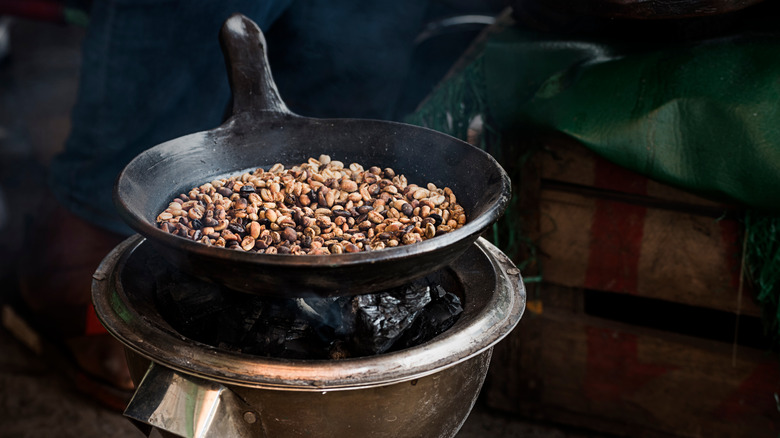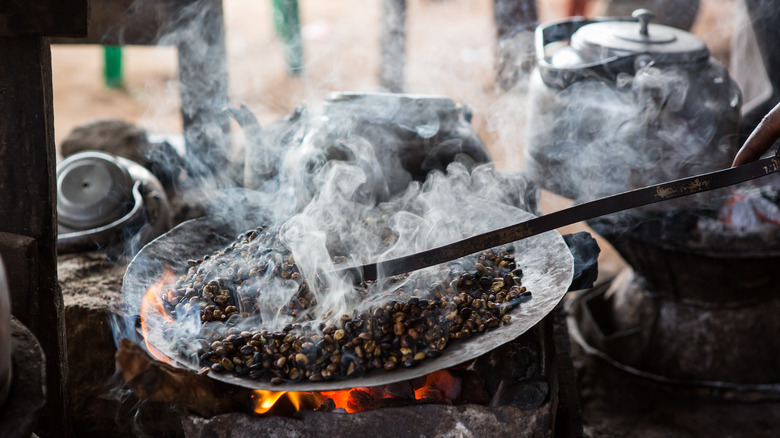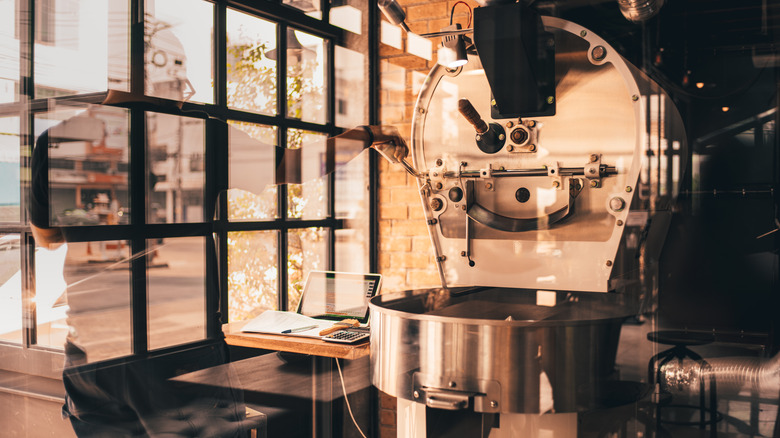The Historic Origins Of Roasting Coffee Beans
From the multi-hour Ethiopian coffee ceremony to the booming coffee pod industry, humanity's love of coffee is widespread and centuries-old (How Stuff Works and Business Wire). While much of coffee's origins are lost to history, folktales and legends have filled in the gaps, giving coffee's story a mythological quality. For example, an Islamic story puts coffee at the moment the Angel Gabriel brought Muhammed the Koran. The legend goes that the angel gave Muhammed coffee, so the founder of Islam could have extra strength and energy (per A History of Coffee).
Another famous story is that of Kaldi, an Ethiopian goat-herder who discovered the benefits of coffee while tending his flock along the Red Sea (per A History of Coffee). Kaldi observed his goats eating the coffee plant and noticed that his sheep began to leap and prance as if dancing energetically. Curious, Kaldi brought the berries to a nearby monastery. As an experiment, the monks brewed a drink from the coffee fruit. The monks noticed the alertness and energy coffee gave them, which came in handy during long prayer sessions. The benefits of this brew quickly spread along the red sea throughout Africa and the Arabian peninsula, so the story goes (via National Coffee Association).
Who discovered roasting coffee beans?
The true origins of roasting and brewing coffee beans are up for debate. We know that, like the story of Kaldi, coffee first grew in Ethiopia and quickly spread as an agricultural crop throughout Africa and the Middle East around the 6th century (per Scribblers Coffee Co.). Many think that the tradition of roasting coffee beans began in the mountainous region of southern Saudi Arabia and Yemen. Burning coffee branches over fires could have prompted the serendipitous discovery of bean roasting.
Historian Ian Berston has a theory, as to how coffee beans wound up in the roasting pan. He links coffee roasting to a popular drink in the Southern Arabian Peninsula called qishr, made from boiled and brewed coffee fruit husks. Berston thinks that people began experimenting with roasting qishr's coffee bean byproducts. In fact, evidence of roasting many different kinds of seeds pre-dates coffee, so perhaps roasting coffee beans wasn't such a far leap, states the book, Home Coffee Roasting.
Roasting, grinding, and brewing coffee was first documented in the Sarawat Mountains in modern-day Saudi Arabia. The 15th century historian Abd Al Ghaffar observed and wrote about the Sufi mystics roasting beans and drinking coffee to help them stay awake during prayer (via BBC). Traditionally in the region, the beans are roasted over an open fire in a metal pan and stirred with a long metal spoon.
Coffee roasting modernizes
Once the coffee houses in the Middle East, eastern Europe, and North Africa began to thrive, travelers encountered the delicious ritual, and the tradition spread says Home Coffee Roasting. As coffee's popularity rose, so did innovations to make larger, more efficient, and reliable batches. In the 17th century, the cylindrical coffee roaster operated by a hand crank was developed in Cairo, Egypt, per the Perfect Daily Grind.
During the 19th century's industrial revolution, coffee roasters received another upgrade. Large-batch machines appeared and new components helped roasters track the beans during roasting, states the Perfect Daily Grind. The 20th century brought electricity to roasting, increasing safety and preciseness. Now, digital technology gives coffee roasting more accuracy, and roasters can understand the beans at a chemical level.
Yet, still today, amidst the Sarawat mountains of Saudi Arabia, coffee is grown and roasted traditionally — over a fire in a smoky metal pan. There, the ritual of drinking coffee is linked to the etiquette of hospitality and community building. Hosts show respect for guests by attending to their coffee cups. Sara Alali, a Riyadh-based coffee grader and café owner, told BBC, "For Arabs and Saudis, coffee is an integrated part of our culture and identity. It's how we show generosity and hospitality." At its roots, roasting and enjoying coffee beans was born out of ritual, community, and connection.


